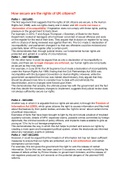Essay
Ultimate A* Level Politics Essay Plans - Paper 1 + 2
- Module
- Unit 1 - People and Politics
- Institution
- PEARSON (PEARSON)
Contains 19 A* essay plans for Paper 1 and Paper 2 Edexcel Politics. I achieved an A* in the 2022 exams, these essay plans are in great detail with key statistics and evidence and strong analysis needed to get into the top level :) 1. How secure are the rights of UK citizens 2. Which party syste...
[Show more]



